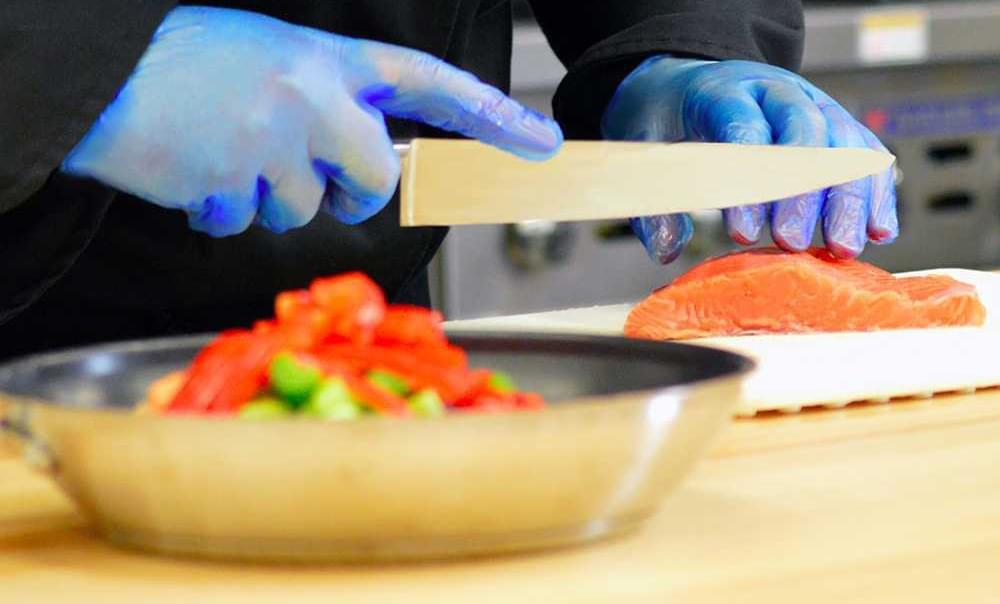The Norovirus is commonly associated with wide-spread illness that occurs on cruise ships, but those account for only about 1% of all reported norovirus outbreaks. Recent news of Norovirus affecting a popular restaurant chain confirms that it can occur anywhere people gather or food is served. Infected people can spread norovirus to others through close contact or by contaminating food and surfaces. Food service workers who have the norovirus can contaminate food and make many people sick. However, there are ways to help prevent norovirus outbreaks in the food service industry such as following food service safety practices like proper barrier protection and hygiene policies.
A Boston-area Chipotle has been shut down temporarily after an employee was diagnosed with norovirus and two others reported similar symptoms,CBS Boston reports.
News such as this highlights the facts that the Norovirus, is highly contagious – often spread by infected food service workers – and immediate action should be taken to help prevent norovirus outbreaks in the food service industry.
Consider these Norovirus statistics from The Centers for Disease Control and Prevention:
About 20 million people get sick from norovirus each year
Norovirus outbreaks from contaminated food are common in the food service industry because food service industry workers often go to work when they are sick and may contaminate food. Of outbreaks caused by infected food workers, 54% involve food workers touching ready-to-eat-foods with their bare hands. Ready-to-eat foods are foods that are ready to be served without additional preparation, such as washed raw fruits and vegetables for salads or sandwiches, baked goods, or items that have already been cooked.
Observations of food service workers have shown that they practice proper hand washing only 1 in 4 times.
Norovirus is hard to kill and stays on food, kitchen surfaces, and utensils. It can remain infectious on foods even at freezing temperatures and until heated above 140°F and can stay on countertops and serving utensils for up to 2 weeks. Norovirus can also be resistant to many common disinfectants and hand sanitizers.
What can be done to help prevent norovirus outbreaks in the food service industry?
Food service industry can
- Adhere to food safety laws and regulations.
- Certify kitchen managers and train food service workers in food safety practices.
- Establish policies that require workers to stay home while sick with vomiting and diarrhea for at least 48 hours after symptoms stop.
- Foster a work environment that encourages workers to stay home when sick, by considering such measures such as paid sick leave and a staffing plan that includes on-call workers.
Food service workers can
- Tell a manager when sick with symptoms of norovirus such as vomiting and diarrhea.
- Wash hands carefully and often with soap and warm water for at least 20 seconds, especially after using the restroom.
- Use single-use disposable gloves to avoid touching ready-to-eat foods with bare hands.
- Regularly clean and sanitize kitchen surfaces and frequently touched objects, using a chlorine based product or other sanitizer approved by the Environmental Protection Agency for use against norovirus.
- Immediately block off, clean, and disinfect areas where there has been a vomiting or diarrheal incident.
- Carefully wash fruits and vegetables and avoid serving undercooked (below 140°F) oysters and other shellfish.
- Visit www.FoodSafety.gov for the latest information.
Due to the nature of the food service industry – where workers directly handle food – disposable glove usage in this sector is common. The U.S. Federal Drug Administration (FDA) requires all employees to wash their hands if they make contact with food. However, when it comes to the prevention of norovirus, food service disposable gloves are the most effective barrier protection according to the CDC – it helps to prevent the spread of the norovirus.
The CDC strongly recommends food workers use disposable gloves to avoid touching food with bare hands.
Food service disposable gloves, such as polyethylene gloves commonly referred to as poly gloves are a popular choice in the food service industry. Disposable poly gloves such as, AMMEX Poly are ideal for food service since they are single-use and workers tend to switch between various light-duty tasks, and they need a disposable glove that can accommodate their workflow.
Another popular single-use disposable glove for food service is polyvinyl chloride (PVC), also known as vinyl. Disposable gloves such as AMMEX AntiMicrobial Vinyl are single use, FDA approved for food service and they contain an antimicrobial agent to help inhibit the growth of microorganisms.
Regardless of which disposable gloves food service workers use, poly, vinyl, and latex disposable gloves are a smart investment for the food service industry. Food service disposable gloves can help prevent norovirus outbreaks in the food service industry – protecting workers and consumers against foodborne illness – And helps to protect businesses against tarnished reputations and decreased profits when restaurants have to close due to outbreaks. Thousands of distributors rely on AMMEX to supply their customers in the food service industry with high-quality AMMEX disposable gloves.









